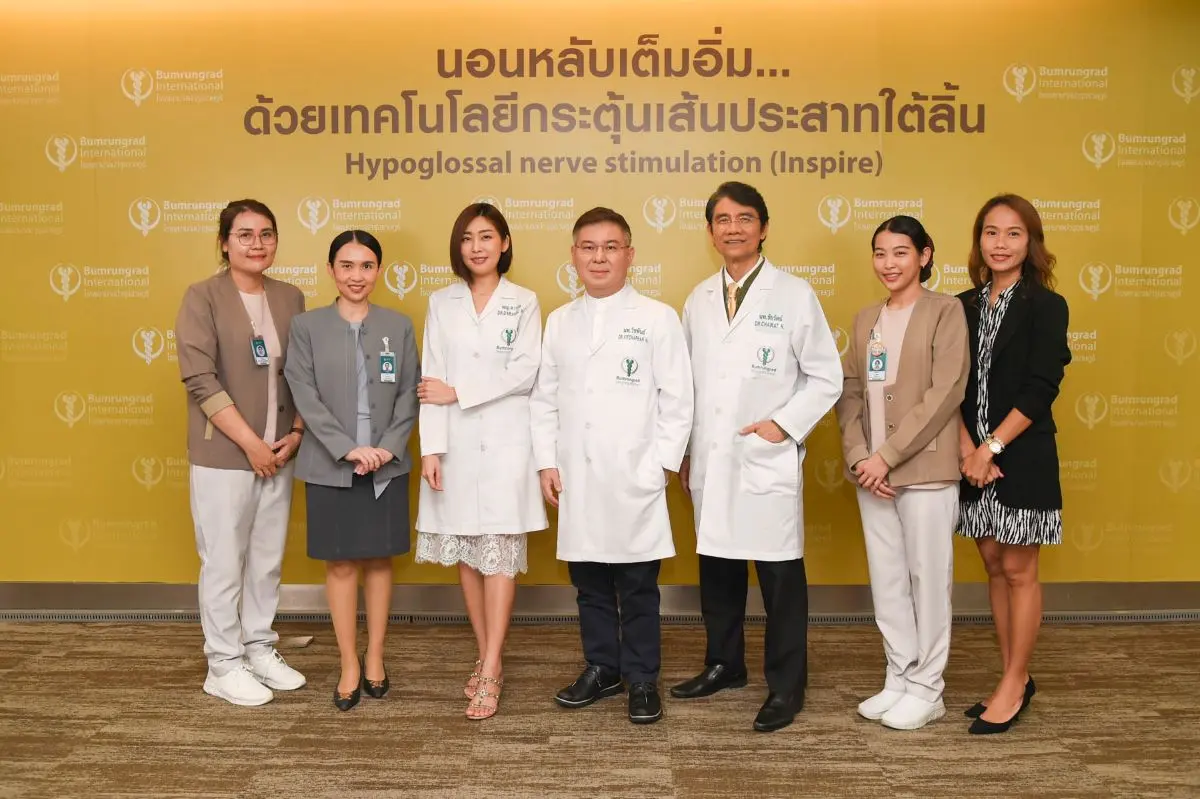Obstructive Sleep Apnea (OSA) is not just a sleep problem, but a silent global health threat. According to The Lancet Respiratory Medicine, in 2019, there were as many as 936 million OSA patients worldwide. In Thailand, it is estimated that 20-30% of middle-aged men and 10-15% of women may have this condition without knowing it. This disease has a severe impact on quality of life, from daytime fatigue to an increased risk of chronic disease, such as heart disease, stroke, and diabetes.
As a global leader in healthcare, Bumrungrad International Hospital introduced “Hypoglossal Nerve Stimulation: HNS” or “Inspire,” which is a new treatment option for OSA. HNS was the only application of its kind, approved by the U.S. Food and Drug Administration (US FDA) in 2014, and has been used to treat over 100,000 patients in the United States, Europe, and leading Asian countries, including Japan and Singapore. This demonstrates global acceptance by the medical community, ensuring its effectiveness and safety.
In Thailand, HNS was certified by the Thai Food and Drug Administration (TFDA) in 2024 and was first used in July 2025. Currently, Bumrungrad International Hospital has successfully treated patients with satisfactory results, thanks to an expert team of multidisciplinary specialists experienced in diagnosis and comprehensive treatment planning.
Physicians Warn of the Silent Danger of Sleep Apnea:
Darakul Pornsriniyom, MD, Neurology Specialist and Sleep Medicine Specialist at Bumrungrad International Hospital, said, “Sleep apnea is caused by the muscles in the upper airway relaxing during sleep, depriving the body of oxygen and forcing the brain to periodically wake up. This makes for poor sleep and negatively impacts quality of life in many ways, including feeling tired and drowsy during the day, decreased work efficiency and memory, and mood swings. Also, it increases the risk of accidents caused by falling asleep while driving. Loud snoring can also disrupt relationships.
Over the long term, this condition increases the risk of diabetes, high blood pressure, and heart diseases such as arrhythmias, heart failure, and coronary artery disease. It also increases the risk of stroke, Alzheimer’s disease, certain cancers, and sexual dysfunction. If you notice symptoms such as unusually loud snoring, shortness of breath, or waking up feeling unrefreshed, a sleep test is highly recommended to assess the severity of the condition, and you should seek treatment promptly before it leads to serious health problems.
“HNS” is a Cutting-Edge Technology Option for Patients Who Cannot Use a CPAP Machine:
Chairat Neruntarat, MD, Professor, Otolaryngology Specialist and Sleep Otolaryngology Specialist at Bumrungrad International Hospital, said, “There are many treatments for snoring and sleep apnea. For example, using a CPAP machine, which uses positive air pressure to push air into and widen the airway. It is currently the most effective treatment. However, some patients are unable to tolerate CPAP use due to discomfort from wearing the mask or other limitations. So, “HNS” is a treatment option that fills this gap.
Chairat Neruntarat, MD, Professor commented on the treatment’s success, saying, “The results of a landmark clinical trial, the STAR Trial (Stimulation Therapy for Apnea Reduction), published in The New England Journal of Medicine, confirmed the HNS treatment reduced the number of apnea episodes from an average of 29.3 to just 9 per hour. Also, it improved or stabilized daytime sleepiness over the long term. There was also a less than 2% severe complication rate and a 2% removal rate within two years. Furthermore, more than 90% of patients’ partners reported a significant reduction in snoring.
Experience and Readiness are the Keys to Success:
As an ear, nose, and throat specialist with over 10 years of experience, Vitchaphan Hemrungrojn, MD, Otolaryngology Specialist, Head and Neck Surgeon, and Sinus Surgeon at Bumrungrad International Hospital, commented on Bumrungrad International Hospital’s readiness, saying, “The success of this innovative treatment relies on a highly skilled and experienced team of specialists — including sleep medicine physicians, neurologists, otolaryngologists, and anesthesiologists, working alongside a multidisciplinary team specializing in sleep medicine and hypoglossal nerve stimulation. All individuals must undergo specialized training to ensure a precise, holistic treatment, from screening and diagnosis to surgery and long-term follow-up.”
The HNS procedure takes approximately 2-3 hours, beginning with the implantation of three main devices under the skin: a pulse generator in the upper right chest, a sensing lead in the rib cage, and a stimulation lead under the tongue nerves. The incision is only 2-5 centimeters, and most patients can return home within one day, with a recovery period of approximately 2-4 weeks. Furthermore, the hospital closely monitors each patient’s progress, utilizing a team of doctors working together to develop an appropriate, individualized care plan. After surgery, patients will be scheduled for a one-month evaluation and device activation, with stimulation settings adjusted by a specialist to ensure long-term, sustainable results.
“Bumrungrad International Hospital is now ready to treat snoring and sleep apnea with HNS, which is poised to become a mainstay option for patients unable to use CPAP machines. It caters to the lifestyles of those seeking convenience, as it’s an implantable device that operates quietly. It’s easily controlled with a portable remote, allowing patients to live a normal life, even while traveling abroad. We believe HNS will play an increasingly important role in the treatment of moderate to severe sleep apnea and help prevent further serious health problems,” concluded Chairat Neruntarat, MD, Professor.
